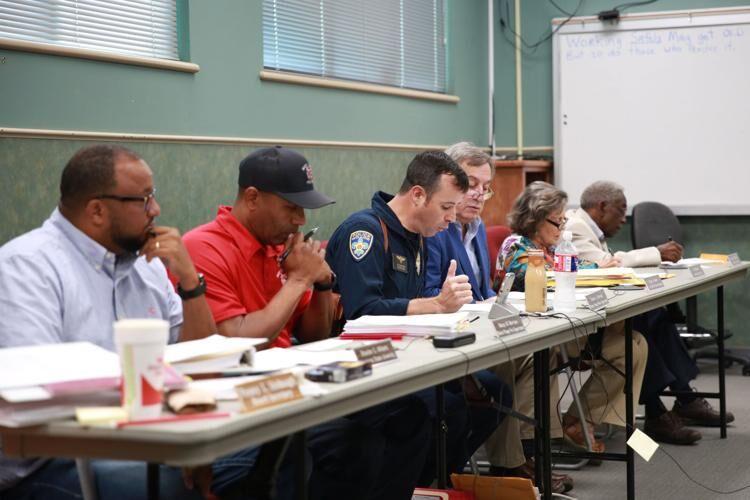Cpl. Robert Moruzzi, chair and Baton Rouge Police Department representative of the Municipal Fire and Police Civil Service Board, resigned Jan. 24, ending his term 18 months early. The university needs to raise its collective voice before the election to fill the vacant seat on this little-known, but powerful, municipal body.
His resignation marked a long-sought change desired by community groups and activists, but it is only the first step in guaranteeing the Board fulfills its duty to Baton Rouge residents.
The Civil Service Board is comprised of five appointees representing the Baton Rouge Police Department, Baton Rouge Fire Department, Louisiana State University, Southern University and the Metropolitan Council. The Board broadly oversees the police and fire departments with the statutory mandate to “represent the public interest in matters of personnel administration.”
“This Board is supposed to be protecting the public interest—that’s what it says in the law,” Jennifer Carwile, a leader with Together Baton Rouge, said. “It’s not to side with the police, it’s not to side with the city—it’s to be neutral.”
While the Board’s oversight encompasses promotions and hiring of police officers and firefighters, one of its more important duties is reviewing firings and disciplinary appeals. The Board’s power over these appeals, especially for police officers, caused many to condemn Moruzzi’s presence on the board.
“It’s egregious that he was even there in the first place,” Community Organizer Walter Geno McLaughlin said. “It speaks to some of the issues the chief’s having with reform. You can choose the best executives and, if he can’t even discipline his officers, nothing will change.”
In March 2010, former police chief Jeff LeDuff fired Moruzzi after an off-duty fight. During the encounter, Moruzzi allegedly attempted to pull down a sign, punched a restaurant manager who intervened, pulled out a firearm, and threatened to kill the manager. However, he returned to the force later that year.
Then, in 2016, a federal jury found that Moruzzi used excessive force against former LSU student Brett Percle and awarded Percle $25,000. The city also paid an additional $51,000 in attorney and court costs. The suit stemmed from a 2014 drug raid where Moruzzi stomped on the back of Percle’s head and knocked out his front teeth.
Moruzzi’s departure creates a make-or-break opportunity for the future of community-police relations in Baton Rouge. For years, while Moruzzi served, the board overturned a number of high-profile appeals, specifically those involving policy violations related to conduct toward residents.
In 2019, the board voted three-to-two to overturn the firing of police officer Yuseff Hamadeh. Hamadeh previously lied about being shot at and returning fire—a claim without any evidence. Later that year, BRPD settled a case with Blane Salamoni, the officer who killed Alton Sterling, because of concerns that the board could overturn his firing.
“You can go to the case of Yuseff Hamadeh—an egregious case like that—the civil service board gave him his job back on a technicality,” McLaughlin said. “Should we be overturning decisions like that?”
In another extreme case last July, the Board voted four-to-one to revise the discipline of Sgt. John Dauthier following an incident where he pushed open a pregnant woman’s door, pulled her onto her deck and arrested her. Officers later realized they went to the wrong house.
Whoever fills the police department vacancy left by Moruzzi on the Civil Service Board should be an officer without a disciplinary record.
“It would just be really nice if they could select somebody without that baggage,” Carwile said. “I think that would do a lot to heal relationships instead of continuing to put people with use of force violations in these powerful positions.”
With nearly 600 sworn officers on the force, this should not be difficult.
“I got to think that one exists,” Eugene Collins, president of the NAACP Baton Rouge Branch, stressed. “I got to think that there’s somebody out there that’s not tied to a major controversial thing that happened in our community that can serve in this role.”
Students, faculty, and administrators must remain vigilant about who succeeds Moruzzi. More importantly, the LSU community must vocally demand that the new appointee balances their role as a representative of the police department with their duty to represent the public interest.
Don’t just take it from me; take it from those who watched the board and police relations for years.
“I think all of [LSU’s organizations] should plug in and use their collective effort to better inform themselves, but also to advocate,” McLaughlin said. “If the community believes that this board consistently serves to undermine [police discipline] we need to look at that.”
The university and other institutions must assert their influence to secure a qualified appointee for the board, Collins said. Members of the LSU community must also remain active in the process to ensure the right candidate is chosen.
“Make your voice heard—that you’re watching and that you want to see people that are doing better,” Carwile stressed. “Be vocal about asking the police force to be diligent about checking who they’re putting on here [and asking] are you putting your best foot forward?”
The university and its stakeholders should leverage any and all influence—formal or informal—to revamp the board’s standing and fulfill its duty to the public at large.
Our university of 41,000 voices holds one-fifth of the civil service board’s power. It is our duty to use that power to inspire meaningful institutional reform.
Drake Brignac is a 21-year-old political communication and political science senior from Baton Rouge.
Opinion: LSU must use institutional power to encourage police reform
February 11, 2022
The Civil Service board during its Sept. 19, 2019, meeting. Robert Moruzzi, center, of the Baton Rouge Police Department reads the agenda for the meeting.








